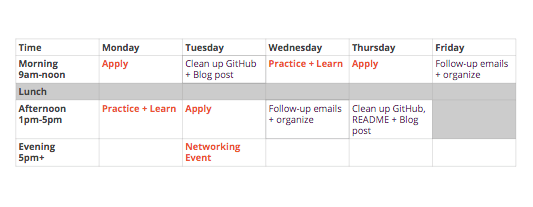How to Get Hired as a Data Scientist
By:Finding a job is hard.
Finding a job when you're starting out in (or transitioning into) a new field, especially data science, can be even tougher. In this post, I'll provide pro tips for how to get hired as a data scientist, based on my experience as a career advisor and recruiter. As a Career Advisor at Metis Chicago, I helped multiple cohorts of students find their first data science jobs and gained significant insight into the process of getting hired.
To start, let's cover a few basics:
Job searching is largely digital nowadays, which makes it incredibly important to be searchable online. Create a LinkedIn profile if you don't have one already, and be sure to stay active on it. Additionally, in data science, maintaining a GitHub repository is a huge plus, and so is having a personal website and/or blog focused on data-related topics. Within this post, I'll go into some specifics about how to fill your new GitHub and blog, so read on for those tips. In the meantime, simply establishing a digital presence is a great first step.
Once you've set up those sites, it's time to start thinking about your P.L.A.N. (Practice; Learn; Apply; Network.)
1. PRACTICE
Start building some stuff! You need to practice your data science skills to keep them sharp. This will help you be better prepared in interviews. Committing to demonstrating your progress on your GitHub and/or blog is also a great way to gain attention from recruiters. During a full-time job search, aim to spend about 5-6 hours per week practicing your skills. A few great ways to spend your time include:
- Kaggle competitions
- Hackathons
- Building projects from scratch
2. LEARN
The world of data science is constantly changing and new technology becomes available all the time. You won't be able to know everything by the time you start applying for jobs, but you should try to stay up on new trends as much as you can. Many employers are looking for someone who is curious and has a thirst for learning, so be sure to dig in and demonstrate what you're learning! I love the following learning resources and have witnessed them benefit many Metis graduates:
- HackerRank
- Code Signal
- Data science blogs and newsletters like Data Science Weekly, or reading posts on Quora
- Meetups like ones hosted by our Metis groups that meet regularly to tackle a variety of topics! (You can also stream those events live or on demand here.)
3. APPLY
Have you ever found yourself filling out a job application, hovering over the "Apply" button, closing your eyes, clicking send – and then just hoping for the best without further action? We've all been there, but there is a better way!
What should the application process look like?
- Find a job you'd like to apply to (don't over analyze this…you can't really tell much about a job/company just from the job description).
- Apply if you feel confident about 50% or more of the job description from at least an entry-level perspective.
- Pay attention to educational requirements and abide by them. (Unless you have a first degree connection who is willing to refer you to the role.)
- Look the company up on LinkedIn to see if you have any connections (1st or 2nd degree).
- If you have a connection…reach out to them! See if they are willing to refer you.
- No connections at this point? You need to submit a cold application. Put together a quality cover letter and submit your application through the company portal.
- FOLLOW UP with at least 2-3 recruiters and a data scientist. Send recruiters a "mini-cover letter."
- How do I message other data scientists?
- Make it about them and their work at the company
- Approach it as a learning experience for yourself
- Ask for an informational interview via phone or coffee
- How do I message recruiters?
- Approach recruiters with a completed "mini cover letter" consisting of:
- Paragraph 1 - your motivation for applying
- Paragraph 2 - your value add
- Paragraph 3 - wrap up
- Approach recruiters with a completed "mini cover letter" consisting of:
- How do I message other data scientists?
4. NETWORK

Who can relate to the image above when thinking about networking? Pretty much everyone! You're definitely not alone if you get nervous about networking with strangers. But think of it this way instead: networking is just meeting individuals with similar interests and talking about cool stuff. Plus, there are very tangible job-related benefits.
- 70% of jobs are found through networking (Bureau of Labor Statistics)
- Meeting people and sharing ideas is critical to growth
- Networking goes hand-in-hand with continuous learning
Networking Strategy:
Find nearby events that look interesting (Meetups, university events, volunteer opportunities, etc.) and aim to go to at least one per week. While at these events, make it a goal to strike up conversations with 3+ people you don't know, and connect with the speakers/hosts, too. Afterward, connect on LinkedIn and follow up. At the event, ask open-ended questions, practice active listening and share your story and goals when appropriate.
Important Networking Reminder: Data scientists are normal people! You are every bit the same caliber "talent" as they are (they have just spent more time doing it). Not everyone will be helpful or nice, but the ones who are can help big time.
5. WHAT COMES AFTER YOU LAUNCH YOUR P.L.A.N.?
It's important to keep yourself accountable after your P.L.A.N. is out there in the world. Create a goals-driven calendar to stay on-track and on-target. Here's an example of a simple one:

Keep track of your job search by:
- Creating a target company list
- Tracking each application
- Company/job title
- Date applied
- Interview stage
- Contact information
- Notes
When you do start getting interviews, be prepared.
- Understand the fundamentals of the company
- How does it make money?
- Who are its customers?
- Who is its competition or who is it displacing?
- How is data science integral to its success?
- Know the company's mission
- Research the background of the founders and key staff
- Research company news and recent developments
Also, start to think about…
- What tools and languages are most important to the company?
- What's the nature of its data?
- How you would operate in this role?
- What is the team structure and dynamic like?
- What's the future of the team and company?
- What are some of its problems or challenges and how can you solve them?
Be ready to discuss:
- Your background (prepare your narrative!)
- How you'll fit into the culture
- Your strengths and weaknesses
- How you might optimize the product
- Salary expectations
And finally, you should also start thinking about technical interviews.
Talk through your solutions because an employer wants to gauge:
- Your thought process
- How you approach a problem
- If you can think fast on your feet
- If you ask for help or ask clarifying questions
If asked a question outside of your domain…
- Do not:
- Answer without a clue of how to solve the problem
- Give up too quickly
- Do:
- Be honest about what you do and don't know about the topic
- Ask follow-up questions and talk through it
- Relate it to something similar that you know about
- WHEN IN DOUBT, DRAW IT OUT
The job search can be a roller coaster ride. There will be ups and downs, and some weeks you'll be busy as all heck, while other weeks may be quieter. But it's important to stay positive and persistent, because it's inspiring to work with someone who is motivated, exhibits grit, and has a good attitude. Remember, it's normal to feel frustration, but if you incorporate the above strategies, I'm confident you'll be able to push through that wall to the ultimate win: the data science job offer!
This article was contributed by Ashley Purdy, Metis Career Advisor, Chicago
This post is based on a workshop that Ashley Purdy gave at Metis's recent Demystifying Data Science online conference. If you'd like access to all recorded talks and workshops (22 in total from speakers across industries!), register here and receive them via email for free.
This post was sponsored by Metis. To learn more about Metis, visit ThisIsMetis.com or check out their reviews on SwitchUp.

